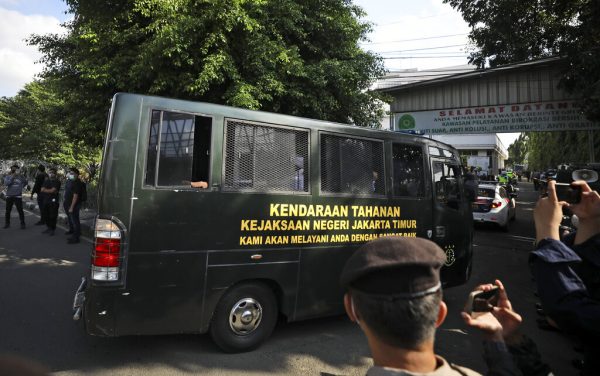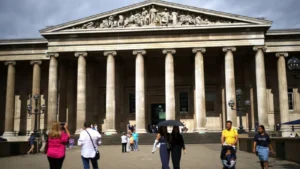
Over the past six months, the Indonesian government has intensified its crackdown on hardline Islamic groups.
A detention car believed to be carrying firebrand cleric Rizieq Shihab arrives at the East Jakarta District Court ahead of his sentencing hearing, in Jakarta, Indonesia, Thursday, May 27, 2021.
A court in Indonesia has sentenced firebrand Islamic cleric Habib Rizieq to eight months in prison for encouraging people to attend mass gatherings in violation of COVID-19 protocols.
In November, Rizieq returned to Indonesia from self-imposed exile in Saudi Arabia pledging to lead a “moral revolution.” In a hearing Thursday that was overseen by 2,300 police officers and soldiers, a three-judge panel found him guilty of drawing thousands of followers to two large events after his return.
As head of the Islamic Defenders Front (Front Pembela Islam, FPI), an Islamist vigilante group, Rizieq is a star figure on Indonesia’s radical religious fringe. An estimated 50,000 supporters swamped him on his return from Saudi Arabia, where he fled in 2017 to escape several criminal charges, including one alleged violation of the country’s pornography law.
Since its establishment in 1998, FPI has had a long track record of harassment and intimidation, especially of religious minorities and those accused of peddling “vice.” It was also a key driver of the massive street protests in 2016 that brought down then Jakarta Governor Basuki Tjahaja Purnama, commonly known as Ahok, who was accused (and later convicted) of profaning the Quran.
Having already spent nearly six months in pre-trial detention, Rizieq is likely to be out of prison soon. But his conviction marks the latest salvo in President Joko “Jokowi” Widodo’s offensive against “radical” Islamic groups, which dates back to downfall of Ahok, a close ally and former deputy of Jokowi.
Enjoying this article? Click here to subscribe for full access. Just $5 a month.
The crackdown was stepped up after Rizieq’s raucous return to Indonesia in November, which threatened to reinvigorate FPI and its hardline allies. Promising to lead a “moral revolution,” the cleric immediately threw himself into political activity, with the aim of consolidating hardline Islamic groups against Jokowi’s government.
The police responded by accusing Rizieq of violating limits on public gatherings by inviting thousands of people to attend his daughter’s wedding and another event at a mosque in the city of Bogor.
Diplomat Brief Weekly Newsletter N Get briefed on the story of the week, and developing stories to watch across the Asia-Pacific. Get the Newsletter
After that, tensions escalated quickly. On December 6, a clash between FPI members and police left six of Rizieq’s bodyguards dead. This was followed promptly by Rizieq’s arrest on a host of charges and the formal banning of FPI, on the grounds that the group was consorting with violent extremist outfits including the Islamic State. By February, most of the group’s top leadership was behind bars.
So far, the response of FPI members to the group’s ban has been muted. The organization has sought to evade the ban by reformulating itself under new names that carry the same initials, but COVID-19 restrictions have prevented it from holding the mass rallies that are its political stock-in-trade.
In a briefing this week , the Jakarta-based Institute for Policy Analysis of Conflict (IPAC) said that the government’s offensive against FPI, which once enjoyed a measure of protection due to its close relationship to the Indonesian police force, was motivated by concerns about the growing political clout that it demonstrated in the campaign against Ahok. It also reflected Jokowi’s desire to present Indonesia as a stable and attractive destination for foreign investment.
However, IPAC warned that meanwhile the government’s broad-brush campaign against hardline Islamic groups ran a risk of trampling over civil liberties and restrict Indonesia’s democratic space. One example it offered was the banning of FPI, which was done by executive order rather than the judicial process outlined in Indonesia’s law on mass organizations.
Another was the government’s increasing effort to screen civil servants and academics at state institutions to prevent the infiltration “radical” elements. According to IPAC, the Jokowi administration has adopted an elastic definition of “radical” that can include a range of government critics. It also has no appeal mechanism for those so excluded.
More broadly, IPAC argues that in failing to address to root causes of Indonesia’s growing political polarization and religious intolerance, its crackdown on FPI and other Islamic groups could ultimately be self-defeating. “The danger now is that some of FPI’s more militant members could be pushed by a sense of unfairness and persecution to more lethal violence,” the briefing concluded, “thus making the government claim that it is linked to terrorism a self-fulfilling prophecy.”






